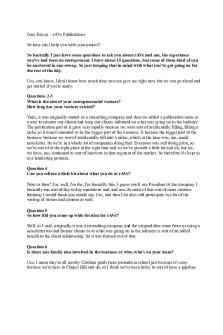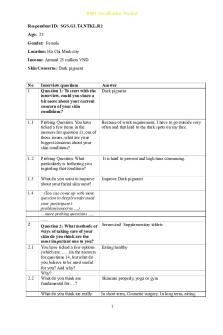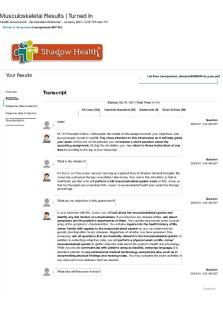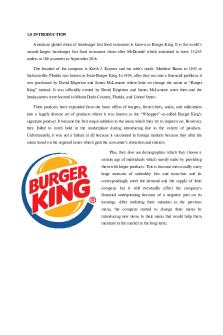King Henry IV Multimodel Transcript PDF

| Title | King Henry IV Multimodel Transcript |
|---|---|
| Author | Damien Wong |
| Course | English: Advanced English |
| Institution | Higher School Certificate (New South Wales) |
| Pages | 3 |
| File Size | 54.8 KB |
| File Type | |
| Total Downloads | 23 |
| Total Views | 176 |
Summary
Module B English Essay, Rank 11 NSW Selective High School...
Description
Transcript The opening of Act 3 Scene is a vivid portrayal of a ruler who confronts the possible disintegration of his realm and an heir apparent who seems to represent the very qualities of leadership that he disdains. The conversation between King Henry and Hal provocatively conveys insights into a ruler who dismisses the illegality of his position by asserting that he possesses the majesty and authority which Richard II lacked. However it is also evident in his monologues that he lacks the moral perspicacity to understand the duplicity that underlies his usurpation of power. As a reflection of Shakespeare's wider exploration of effective leadership as a balance between an assertive enforcement of authority and moral righteousness, this climactic scene is crucial in helping us recognise the conflict a leader confronts is often the outcome of his own actions. However it also draws a dramatic distinction between Hal as a leader who is unencumbered by guilt and is confident of his emergence as a worthy “Prince of Wales” and a reckless leader so obsessed with honour and duty that he is incapable of recognising the folly of his rebellion. Thus in this climactic extension of his examination of the three central characters and their roles as leaders, Shakespeare foreshadows the defeat of Hotspur and Henry’s realisation that Hal is vital in bringing peace to the kingdom. In the dramatic representation of a ruler who confronts the possible repercussions of repudiating the divinely sanctioned order of kingship, Shakespeare creates the understanding that the leader's capacity to maintain civil order results from the astute balance of personal qualities and adherence to a morally sanctioned order. The scene that is the climactic moment of King Henry's despairing recognition that Hal's dissolute behaviour is the metaphorical "rod of heaven/To punish my mistreadings" becomes a validation of the contextual belief in the Divine Rights of Kings. So it enhances our understanding that in this medieval world, the Tudor myth of succession was fundamental to ensuring a stable world. However, Shakespeare's play deals with the complexities of leadership that extend beyond
the simple binaries of right and wrong. The monologue that Henry delivers in a bid to spur Hal's reformation is built on a series of contrasts which delineate the differences between an astute yet Machiavellian schemer who metaphorically "did pluck such allegiance from men's hearts" and a gullible ruler who"mingled his royalty with cap'ring fools". This antithetical representation of himself and Richard II which Henry uses to justify his usurpation of power reinforces an awareness that authority is grounded. As the development of the narrative arc of Henry’s troubled reign, Shakespeare foreshadows this moment in Henry's opening monologue which alludes to the war that results from his deposition of RichardII in visceral images of " shall daub her lips with her own children's blood". This allows Shakespeare to foreground our realisation that chaos ensues when leaders violate the moral authority of God through Machiavellian acts of seizing power. However, this view of corrupt leadership is balanced with the depiction of a king who demands compliance and is willing to enforce it authoritatively. This is clearly presented in his imperative to the Percys, "majesty might never yet endure/ The moody frontier of a servant brow", the metonymy delineating the authority of the leader and the subservient position of his subjects. Additionally, Shakespeare reinforces our understanding of Henry's grim resolution to preserve his power by ensuring the defeat of the rebels. This is dramatically conveyed in this scene. His impassioned evocation of his personal qualities as he attempts to instill in Hal a recognition of princely duty through his ironic subversion of Hal’s motif of the sun in “Extraordinary gaze/Such as is bent on sun-like majesty”, accentuates Henry’s focus on ensuring his position as monarch. However it is also implied that his usurpation has left him vulnerable and that only with Hal’s assumption of his princely role, will he be able to maintain power. Further, we recognise the significance of the scene in extending Shakespeare's exploration of the possibility of effective leadership when those with power deceive in order to ensure that they retain control. Written during the reign of Queen Elizabeth I, Shakespeare presents the contemporary apprehension regarding her successor, hence the ambivalent characterisation of Hal reveals his pragmatism in devising a strategy to ultimately defeat the
rebels who threaten kingship. His characterisation of Hal as possessing the attributes of a pragmatic individual who deliberately and strategically creates a facade as a precursor to his emergence of a morally responsible heir apparent, underlies the Christian notion of virtuous kingship. Hence, Hal’s opening soliloquy introduces his innate awareness of his moral and political responsibilities, clearly established in his metaphorical assertion, “will awhile uphold/The unyok’d humour of your idleness”, a reference to the facade of a dissolute prince he has assumed. However, The temporary connotations of “awhile” together with the planetary allusion, “Herein will I imitate the sun.../By breaking through the foul and ugly mists” enables us to recognise that Shakespeare is presenting Hal as a leader who pragmatically uses deception to ensure that he will fulfill his princely duties when required. This is affirmed when Henry’s condemnation of Hal, explicated in his ironic subversion of Hal’s motif of the sun in,”afford no extraordinary gaze/Such as is bent on sun-like majesty” which is dramatically juxtaposed with Hal’s dignified vow that he “will call him (Hotspur) to so strict account/That he shall render every glory up”. Hence, the visual aid explores how the deliberate schemes upheld by Hal’s deceiving nature also reveals his distinct moral beliefs, where David Boyd’s critical analysis, “It can be argued, and has been, that Hal’s offer to engage Hotspur in single combat “to save the blood on either side” indicates a significantly different sense of honour from Hotspur’s; less egoistic and more socially responsible.” To conclude, through my personal understanding of Act 3 Scene 2 and the text as a whole, Shakespeare explores the possible repercussions in repudiating the divine right to rule, and further proposing that a Machievellian approach to leadership is effective in pragmatically maintaining control of kingship. Thus, addressing contemporary concerns of the Tudor myth of succession, and the apprehension regarding the successor to Queen Elizabeth’s throne....
Similar Free PDFs

King Henry IV Part 1 Speech
- 3 Pages

King Henry IV part 1 essay
- 2 Pages

King Henry Questions
- 2 Pages

Transcript
- 2 Pages

Transcript 2
- 3 Pages

SGS transcript
- 3 Pages

Interview transcript
- 7 Pages

N4685M1 transcript
- 7 Pages

Flivver King
- 5 Pages

King Corn
- 2 Pages

Henry FORD
- 8 Pages

Henry Heinz
- 3 Pages

Henry Ford
- 11 Pages

Musculoskeletal Transcript
- 10 Pages
Popular Institutions
- Tinajero National High School - Annex
- Politeknik Caltex Riau
- Yokohama City University
- SGT University
- University of Al-Qadisiyah
- Divine Word College of Vigan
- Techniek College Rotterdam
- Universidade de Santiago
- Universiti Teknologi MARA Cawangan Johor Kampus Pasir Gudang
- Poltekkes Kemenkes Yogyakarta
- Baguio City National High School
- Colegio san marcos
- preparatoria uno
- Centro de Bachillerato Tecnológico Industrial y de Servicios No. 107
- Dalian Maritime University
- Quang Trung Secondary School
- Colegio Tecnológico en Informática
- Corporación Regional de Educación Superior
- Grupo CEDVA
- Dar Al Uloom University
- Centro de Estudios Preuniversitarios de la Universidad Nacional de Ingeniería
- 上智大学
- Aakash International School, Nuna Majara
- San Felipe Neri Catholic School
- Kang Chiao International School - New Taipei City
- Misamis Occidental National High School
- Institución Educativa Escuela Normal Juan Ladrilleros
- Kolehiyo ng Pantukan
- Batanes State College
- Instituto Continental
- Sekolah Menengah Kejuruan Kesehatan Kaltara (Tarakan)
- Colegio de La Inmaculada Concepcion - Cebu

